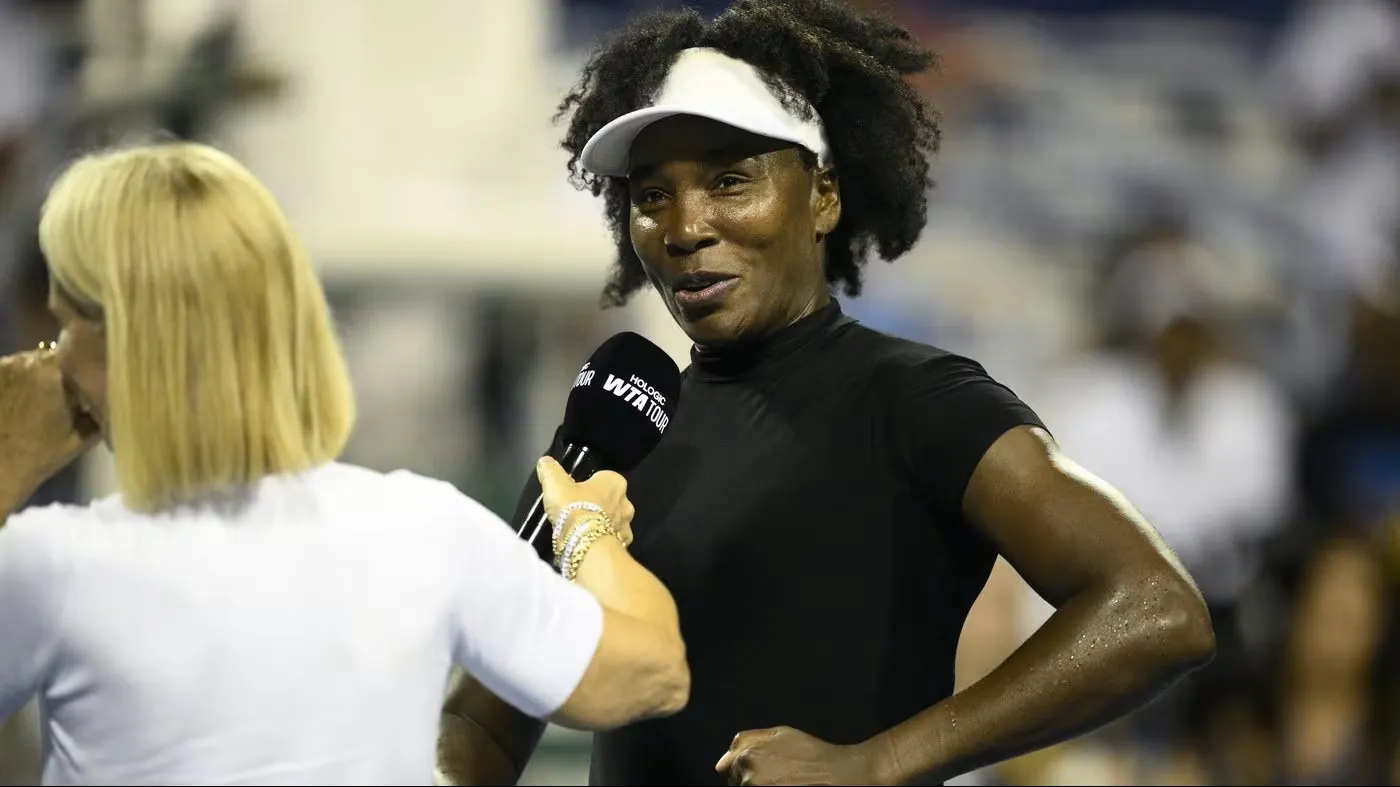George Takei deals only in unwavering optimism and ceaseless charm. Before we’ve even said hello, we’re becoming buddies. “I have a grand-nephew named Marcus. It’s a good name,” he tells me, seconds into our Zoom call.

At 88, his voice, while now a little gravely, still has that quality that commands instant respect; both booming and soothing in equal measure. He looks stately and handsome, perched in a New York hotel room, dressed in a chequered shirt, spotless white blazer. A true, sage gent. “You didn’t exist at the time that Star Trek started,” he chuckles, noting my baby face. And then the optimism comes: “So you’re living evidence that there is life after cancellation.”
Takei’s breakout role came in lieutenant-turned-captain Hikaru Sulu in the 1966 original Star Trek TV series, which managed to survive cancellation to become one of history’s most distinguished franchises. Takei starred in the first six movies, and a slew of other Trekkie media since: Star Trek: Voyager in 1996; a string of video games; that lofty voice used to narrate a number of animated and web series. Yet perhaps his most unlikely gig to come from the Starship Enterprise is the reason we’re talking today: his appearance in fan-made film, Yorktown: A Time to Heal.
In 1985, student Stan Woo began making the amateur project in the Californian forest, boldly writing to Takei to ask if he would take part. A household name post his original Sulu run, no one – least not Takei’s agent at the time – expected him to agree. But he did. After hours spent clambering about a makeshift set, the footage was lost, and the film remained half-made for almost 40 years. It was finally unearthed and published in 2022. Now, Beam Me Up, Sulu, a documentary about the film’s long road to release, and examining how Star Trek forged a path for representation on screen, is premiering at Raindance Film Festival in London.
What did Takei think of Yorktown: A Time to Heal when the film finally came to light? “I thought it was charming,” Takei offers politely, before hinting that the actual Star Trek films, with all their Hollywood gloss, may just pip the fan-made ones to the post on the quality front. “The contrast was obvious, but equally obvious was the passion, the absolute dedication and love and determination to get it done.”
Woo’s passion for his project was the reason why Takei agreed to take part. It reminded him somewhat of his own zealous affection for the Star Trek world after the show’s creator, Gene Roddenberry, explained the extraterrestrial concept to him when they first met via legendary casting director Hoyt Bowers 60 years ago. “I desperately wanted to be cast,” he says. He recalls urging his agent to “pull all the strings” to land him the role. Seeing such passion from fans – “to the point where people think they’re crazy” – reflected back at him six decades on still dumbfounds him.
Back to the optimism. Roddenberry wanted to use Stark Trek as a Trojan horse for bringing attention to the major social issues of the era. “We have a history of racism, warfare, poverty and turbulence in the United States. We even fought a civil war,” Takei says. “And yet he felt optimistic because he saw a change happening.” It’s why he cast Black actress Nichelle Nichols as Uhura in a leading role – the first for an African-American woman on TV – just one year after the official end to segregation in the States. Uhura would later kiss William Shatner’s Captain Kirk, in what was one of TV’s first interracial kisses. Even having Takei, a Japanese American, in a lead role was deemed groundbreaking.
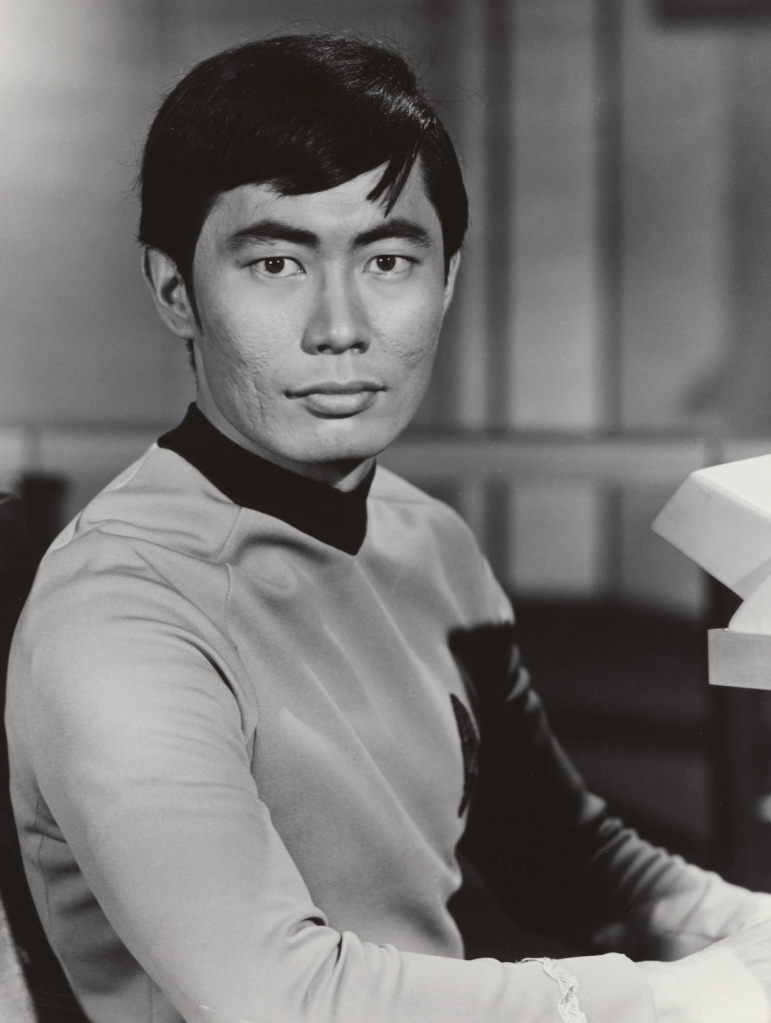
Roddenberry implemented the Infinite Diversity in Infinite Combinations (IDIC) ethos into the show, whereby there was a problem at hand, and “all these people [who] were from different backgrounds, different histories, different experiences, and different vantage points on a particular issue, all [contributed] to solving that problem.” The impact of that diversity on screen is laid bare through emotional testaments in Beam Me Up, Sulu, as drag queens, transgender people, Black folk, Asian folk, and those who are blind, deaf and disabled movingly recount how the franchise has given them a space to feel at home.
You might say George Takei learned his optimism from Roddenberry, but he actually had to find it at a much younger age. He was born to a Japanese American mother and a Japanese father, and the family were living in California at the time Pearl Harbour was bombed in 1941. Every Japanese American was deemed the enemy. President Roosevelt ordered all Japanese Americans on the west coast to be rounded up and sent to internment camps.
Takei, who is sprightly, warm company, looks horror-stricken as recalls what happened next. On a May morning in 1942, weeks after Takei’s fifth birthday, his father burst into the bedroom he shared with his brother Henry, and told him to wait in their living room while his parents finished packing.
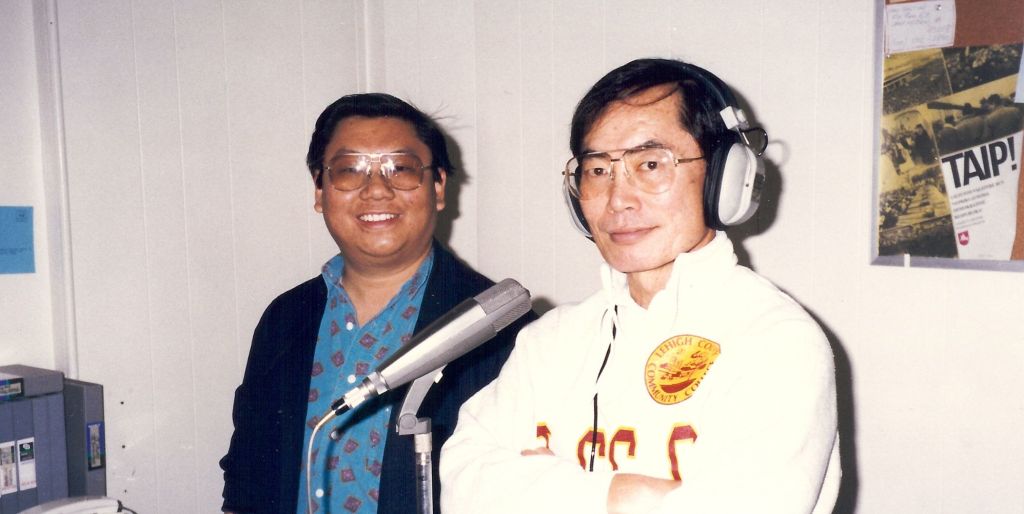
“Henry and I were just gazing out the window out at the neighborhood. Suddenly, I saw two soldiers marching up our driveway. They carried rifles with shiny bayonets on them. They stomped to the front door, and with their fists began banging on the door. Henry and I were petrified,” he says. His memory is harrowingly clear, and the colour has drained from his face. “One of the soldiers pointed his bayonet at our father right in front of us. Right before our eyes. We were really terrorised and they said, ‘Get your family out of this house.’”
His parents grabbed their small suitcases and a single duffel bag, his mother carrying their baby sister in her arms. “Tears were streaming down her cheeks. I’m 88 now, so 83 years ago. I was five-years-old, but that memory is seared onto my brain and that’s how our imprisonment for four years began.”
As a young boy, Takei had to hope that there was a better future for him. As an adult, he’s had to hope that there is a better future for everyone. He’s been politically involved all his life, and is now arguably best known for his viral, pro-peace, anti-Trump posts on social media (he was previously an X user, but abandoned the platform for Bluesky, where he is the third most-followed account). Yet, for the first 68 years of his life, Takei stayed silent on one issue particularly close to his heart: the fight for LGBTQ+ rights.
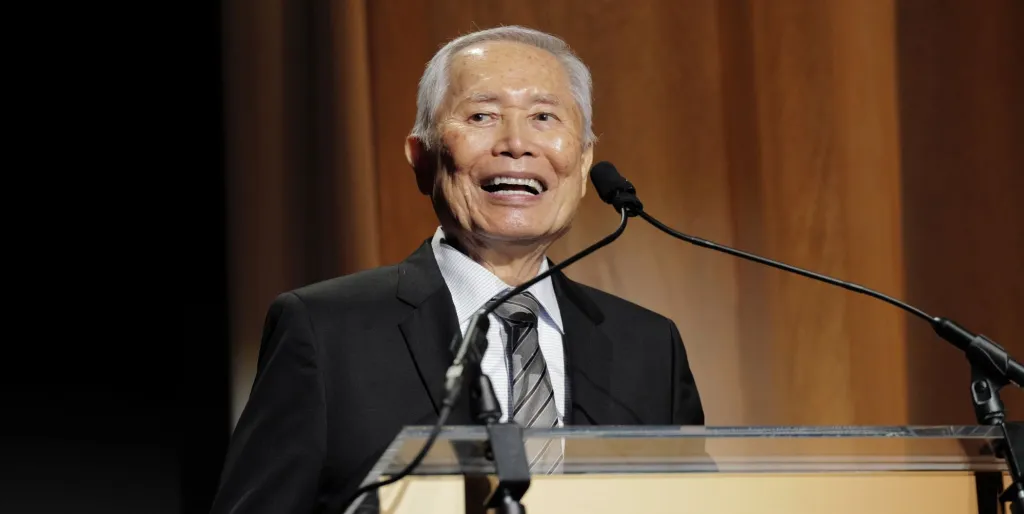
Takei’s vivid memory is back in action as he recounts when he first realised that he is gay. “From about nine or 10-years-old at school, I discovered that I thought boys were so attractive,” he grins impishly. He recalls one classmate who had “the sweetest smile” and “long lashes around his eyes”, and another who, while playing marbles, leant over and exposed the small of his back, leaving Takei flustered.
His heartthrob was gay 1950s star Tab Hunter who, after gossip columns insinuated he was a homosexual, saw his bright career dimmed. “There again was a lesson to me.. You can’t pursue an acting career and have the public know that you are gay. If you’re gay, you don’t get cast. And so I decided I’m not going to let people know,” Takei says.
It was fellow Hollywood star and former politician Arnold Schwarzenegger who inspired – or rather, incited – him to come out publicly. In 2005 the Terminator star, during his governorship of California, vetoed a bill which would have legalised same-sex marriage in the state, despite suggesting he was “open-minded” on the prospect.
“I was suspicious about [him] supporting LGBTQ people,” Takei says. “When he ran for governor, he ran by saying, ‘I’m from Hollywood. I’ve worked with the gays and lesbians. Some of my friends are,’ and all that rhetoric to make the impression that he’s supported [us].” After Schwarzenegger vetoed the bill, Takei came out publicly in “anger”, and by the sounds of it, he’s still angry now. “To really underscore what a hypocrite he is, he was having an affair with his own housekeeper under his wife’s nose, he had an illegitimate son by that keeper.” Schwarzenegger and his wife, Maria Shriver, divorced shortly after his infidelity came to light, and the actor-turned-politican has since voiced his support for gay marriage.
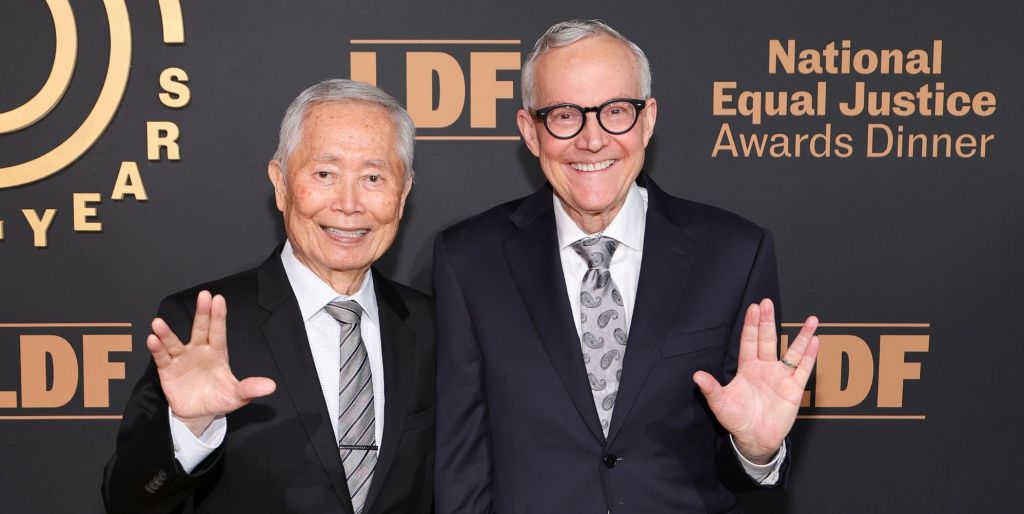
George Takei and his now husband Brad became the first couple same-sex couple to apply for a marriage licence in West Hollywood in 2008, and have now been together for 38 years. In the 20 years since coming out, Takei has made LGBTQ+ activism a daily part of his life, in part, due to “guilt”. “I felt so guilty for for being silent. I mean, I’ve been a vocal on all these other issues. The civil rights movement movement for African Americans; the peace movement during the Vietnam War; nuclear testing. All those issues I was very vocal on, and my most personal issue, I was silent on. So, I needed to pay back.” He feels he owed it to the LGBTQ+ activists who were loudly and proudly fighting for him to one day live openly. “I’m so indebted to those brave LGBTQ people who sacrificed on my behalf.”
How does he feel about Donald Trump’s return, and the wave of anti-LGBTQ+ executive orders he’s tried to push through? Takei laughs at my suggestion that he’s “not the biggest fan” of the president, as that is perhaps the year’s biggest understatement. Some stars seem hesitant speaking out about the all-powerful president, but not Takei. “He is a menace,” he says. “I’m opposed to him, and I don’t want to say publicly what I think will really happen to him.”
One of the reasons that Takei’s brand of activism is so popular online is because he is very funny with it. We’re speaking the day after Trump and Elon Musk had their infamous break-up, and Takei has just gone viral on Bluesky with this zinger, referencing his own infamous feud with his Star Trek co-star Shatner: “Next to Trump and Musk, Shatner and I look like adoring newlyweds.” Then, days later in response to Trump’s controversial military parade flop: “What if he threw a $45 million parade and nobody came? Boring. Low energy. Sad!”
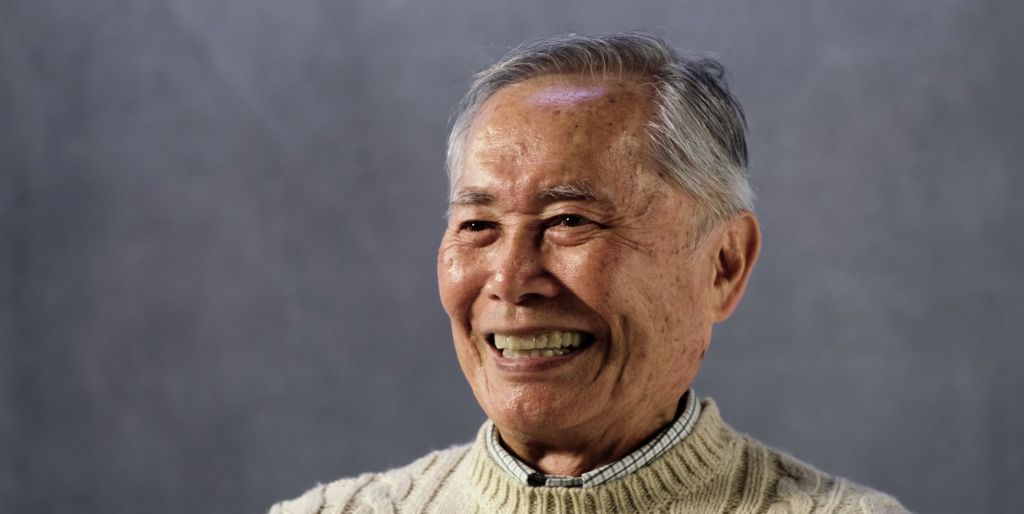
Takei knew Trump was going to be re-elected. “We’re living in terrible times again. We have a totally insane president of the United States and now even the conservative sector is breaking up,” he sighs, referencing the Trump-Musk clash. “But history has a way of being cyclical, and we are going through another one with this clinger-on in the White House.”
But remember, this is George Takei, Optimist-in-Chief. “My loins are girded for what might be happening, but we always survive those horrific periods as long as we have our eyes fixed on the north star. As long as we have our values in place, our morality, I think ultimately we will prevail.”
We’re at the end of our time together, but not before Takei asks me to try the famous Star Trek Vulcan salute. He lets out a hearty laugh as I finally get it right. “There! You got it. It means live long and prosper. That’s a very optimistic sign.”
Beam Me Up, Sulu premieres at Raindance Film Festival on 25 and 26 June 2025. Tickets here.
Share your thoughts! Let us know in the comments below, and remember to keep the conversation respectful.
-(1)-1750384301-q80.webp)

